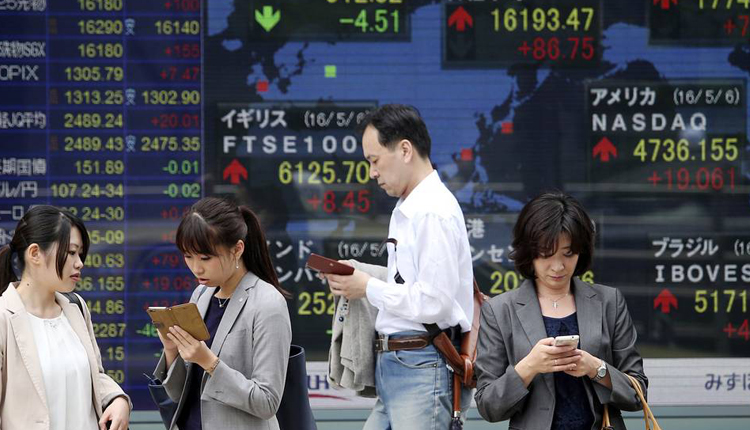Asian stocks mostly fell in the afternoon, as developments on Brexit overnight meant the deadline for the U.K. to leave the EU would likely be delayed again.
Among mainland Chinese stocks, the Shanghai composite edged down 0.16 percent, while the Shenzhen composite lost 0.31 percent.
Hong Kong’s Hang Seng index tumbled 0.82 percent.
Australia’s S&P/ASX 200 closed flat to 6,673.10. Japan’s markets reopened after a holiday on Tuesday, with the Nikkei 225 rising 0.24 percent. Softbank shares tumbled 2.89 percent, as the Japanese tech giant struck a deal to take over the embattled WeWork.
South Korea’s Kospi was down 0.36 percent. Major Apple supplier LG Display is set to report its third-quarter earnings on Wednesday at 2:30 p.m. HK/SIN. Samsung Biologics is also set to report third-quarter earnings.
Ahead of the earnings reports, LG Display fell 2.07 percent in the afternoon. Meanwhile Samsung Biologics surged 8.87 percent amid anticipation that U.S. drugmaker Biogen may place a manufacturing order for its Alzheimer’s treatment.
Over in Singapore, the Straits Times Index was down 0.59 percent. Shares of conglomerate Keppel, after surging as much as 16 percent on Tuesday, maintained investor interest and gained another 0.6 percent through Wednesday afternoon. That followed a surprise $4 billion partial bid by Singapore state investing giant Temasek Holdings earlier this week.
Overall, MSCI’s broadest index of Asia-Pacific shares outside Japan was 0.46 percent lower.
Thailand’s markets are closed for a holiday.
Meanwhile, the International Monetary Fund released new projections on Wednesday that showed growth in Asian economies could be slower than expected. It said growth in Asia could moderate to 5 percent in 2019, and 5.1 percent in 2020 — that’s 0.4 percent and 0.3 percent lower than its April projections.
Overnight, the sterling was hit by Brexit developments. U.K. lawmakers voted to reject a limited time frame for reviewing legislation related to Britain’s withdrawal from the European Union. It now means that the U.K. is almost certainly not going to leave the U.K. on October 31— the current deadline, and the EU may provide an extension to prevent a no-deal Brexit occurring.
In reaction, the British pound fell 0.1 percent versus the dollar. It fell further following the news— last at 1.2860, below the 1.29 level where it had been holding.
“Ahead of the Brexit votes markets were essentially marking time, but reaction to the vote news now sees the pound as the big underperformer, down 0.69 percent relative to levels this time yesterday.But at 1.2899, is probably fair to say the market remains relatively upbeat on GBP fortunes,” said Rodrigo Catril, a senior currency strategist at the National Australia Bank, in a morning note.
On Wall Street, stocks fell as investors digested earnings reports. More than 19 percent of S&P 500 companies have reported quarterly numbers and of those, nearly 80 percent have beaten expectations.
Currencies and oil
The U.S. dollar index, which tracks the greenback against a basket of its peers, was last at 97.570, sliding from an earlier high of 97.599.
The Japanese yen traded at 108.35, strengthening from 108.51 seen earlier. The Australian dollar changed hands at $0.6844 following a low of $0.6831 seen earlier.
Oil prices, meanwhile, surged higher on reports that Organization of the Petroleum Exporting Countries and its allies could be thinking of cutting production further, according to a Reuters report.
Earlier, Brent crude oil settled 1 percent higher at $59.59 a barrel, while U.S. West Texas Intermediate crude rose 1.6 percent to $54.16 per barrel. In the afternoon during Asia hours, some gains were trimmed, with Brent crude falling 0.47 percent to $59.42, while U.S. crude was down 0.79 percent to $54.05.
Source: CNBC


